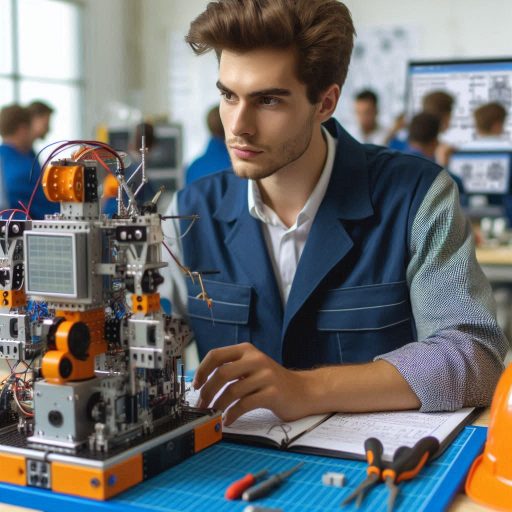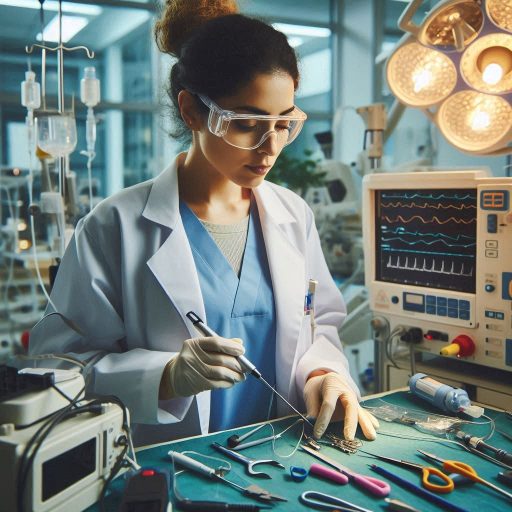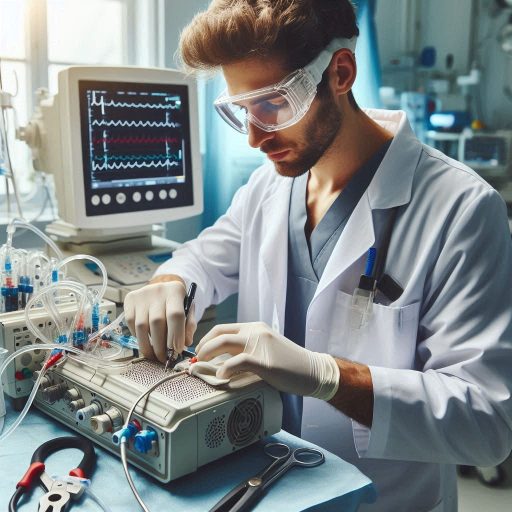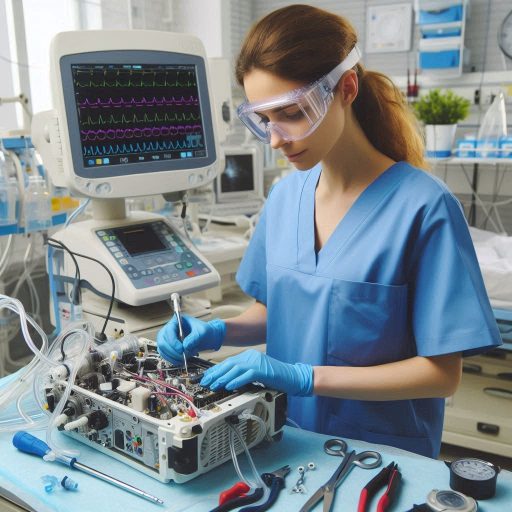Introduction
A biomedical equipment technician plays a critical role in ensuring that medical equipment is functioning properly in healthcare settings.
They are responsible for the maintenance, repair, and calibration of various types of medical equipment.
Brief overview of the role of a biomedical equipment technician
Biomedical equipment technicians are skilled professionals who work with a wide range of medical devices, such as X-ray machines, CT scanners, defibrillators, and infusion pumps.
They are trained to troubleshoot and diagnose issues with equipment to ensure patient safety.
Importance of biomedical equipment technicians in healthcare settings
Biomedical equipment technicians play a crucial role in healthcare facilities by ensuring that medical equipment is safe and reliable for patient care.
They are responsible for keeping equipment up to date with the latest technological advancements and regulatory requirements.
Without biomedical equipment technicians, healthcare providers would not be able to rely on the accuracy and functionality of medical devices, which are vital for diagnosis and treatment of patients.
Their expertise helps to prevent equipment malfunctions, resulting in improved patient outcomes and overall quality of care.
Basically, biomedical equipment technicians are indispensable members of the healthcare team, working behind the scenes to ensure that medical equipment is operating at peak performance.
Their dedication and expertise contribute to the overall success and efficiency of healthcare facilities, ultimately benefiting patients and healthcare providers alike.
Education and Training Required
Biomedical equipment technicians (BMETs) need a solid educational foundation to excel in their roles.
Typically, a high school diploma or equivalent is the minimum requirement.
However, most positions demand further education.
Many BMETs pursue an associate degree in biomedical equipment technology or a related field.
This degree often covers topics such as electronics, medical terminology, and equipment maintenance.
Some roles may also require a bachelor‘s degree for more advanced positions.
Coursework in medical technology and engineering principles provides essential knowledge for the role.
Additionally, understanding medical equipment standards and regulations is crucial.
Certification and Degree Programs Available
Certification is crucial for a successful career as a BMET.
Several professional certifications are available to enhance career prospects.
The most recognized certification is the Certified Biomedical Equipment Technician (CBET) offered by the Association for the Advancement of Medical Instrumentation (AAMI).
This certification validates a technician’s knowledge and skills in maintaining and repairing medical devices.
Other certifications, such as the Certified Radiology Equipment Specialist (CRES) and Certified Laboratory Equipment Specialist (CLES), are also valuable.
Degree programs from accredited institutions provide a structured path to entering the field.
Many programs offer hands-on labs and practical experiences, which are essential for building skills.
Hands-on Training and Experience Needed for the Role
Hands-on training is crucial for becoming a proficient BMET.
Practical experience often complements classroom learning.
Internships and apprenticeships provide real-world exposure to medical equipment.
Many educational programs include clinical rotations or lab work as part of their curriculum.
During these periods, students work with actual equipment, learning maintenance and repair techniques.
Additionally, on-the-job training after hiring helps technicians adapt to specific equipment used by their employer.
Continuous learning is essential, as technology in the medical field evolves rapidly.
Staying updated with new equipment and techniques ensures effective performance and career growth.
In summary, becoming a biomedical equipment technician involves a combination of education, certification, and hands-on experience.
Formal education provides the foundational knowledge needed for the role.
Certification enhances credibility and career opportunities.
Practical experience through internships and on-the-job training develops the skills necessary to maintain and repair complex medical equipment.
Together, these elements prepare technicians to meet the demands of this vital healthcare profession.
Read: Top CAD Software for Aspiring CAD Technicians
Day-to-day responsibilities
Biomedical equipment technicians play a vital role in healthcare settings by ensuring medical equipment functions properly.
Their daily responsibilities involve a range of tasks that keep medical devices in optimal condition, ensuring patient safety and effective treatment.
Performing Routine Maintenance on Medical Equipment
One of the primary responsibilities of a biomedical equipment technician is performing routine maintenance on medical equipment.
This involves inspecting devices regularly to identify potential issues before they escalate.
Technicians check for wear and tear, clean components, and replace parts as needed.
Regular maintenance is crucial to prevent unexpected equipment failures, which could disrupt patient care.
By ensuring that each device functions as intended, technicians help maintain a smooth workflow in healthcare facilities.
Troubleshooting and Repairing Equipment as Needed
When medical equipment malfunctions, biomedical equipment technicians are responsible for troubleshooting and repairing it.
This task requires a deep understanding of the devices and the ability to quickly identify problems.
Technicians use specialized tools and diagnostic software to pinpoint the issue and determine the best course of action.
Whether it’s replacing a faulty component or recalibrating a system, the goal is to restore the equipment to working order as quickly as possible.
Quick repairs minimize downtime and ensure that patients receive timely care.
Calibrating Equipment to Ensure Accuracy
Calibration is another critical duty of biomedical equipment technicians.
Medical devices must deliver accurate results to ensure proper diagnosis and treatment.
Technicians regularly calibrate equipment to verify its precision and make necessary adjustments.
This process involves comparing the device’s output against known standards and fine-tuning it as needed.
Accurate calibration is essential for maintaining the reliability of medical equipment, which in turn supports high-quality patient care.
Technicians must stay up-to-date with calibration protocols to ensure compliance with industry standards.
Keeping Detailed Records of Equipment Maintenance and Repairs
Biomedical equipment technicians must keep detailed records of all maintenance and repairs performed on medical equipment.
Accurate documentation is essential for tracking the history of each device, ensuring compliance with regulations, and planning future maintenance schedules.
These records include information on the type of service performed, the parts replaced, and the date of the maintenance or repair.
By maintaining thorough records, technicians can identify patterns in equipment performance, anticipate potential issues, and make informed decisions about equipment management.
These records also provide valuable information during audits and inspections.
In summary, biomedical equipment technicians are crucial in ensuring the safety and effectiveness of medical devices.
Their day-to-day duties include performing routine maintenance, troubleshooting and repairing equipment, calibrating devices for accuracy, and keeping detailed records.
These tasks help maintain the reliability of medical equipment, contributing to the overall efficiency of healthcare facilities and the well-being of patients.
Read: How to Become a CAD Technician: Step-by-Step Guide
Working Environment
Biomedical Equipment Technicians (BMETs) work in diverse environments, including hospitals, clinics, and research facilities.
Their primary responsibility is to maintain and repair medical equipment essential for patient care.
BMETs often navigate between different departments, ensuring that all devices are in optimal condition.
The work environment is dynamic, with each day presenting new challenges.
Whether it‘s diagnosing equipment issues or performing routine maintenance, BMETs must adapt quickly to varying situations.
The role demands attention to detail, as even a small oversight can impact patient safety.
Hospitals, Clinics, Research Facilities, and Other Healthcare Settings
BMETs are crucial in hospitals, clinics, research facilities, and various healthcare settings.
In hospitals, they focus on ensuring that life-saving devices like ventilators and defibrillators function without fail.
In clinics, BMETs may work with diagnostic tools such as ultrasound machines and X-ray equipment.
Research facilities require their expertise to maintain specialized laboratory equipment.
Each setting presents unique challenges, requiring BMETs to be versatile and knowledgeable about different types of technology.
Their work directly supports the healthcare professionals who rely on this equipment to deliver quality patient care.
Collaborating with Medical Staff to Ensure Equipment is Functioning Properly
Collaboration with medical staff is a key aspect of a BMET‘s role.
They work closely with doctors, nurses, and other healthcare professionals to ensure equipment meets clinical needs.
BMETs often provide training to medical staff on the correct use of equipment, reducing the risk of misuse.
Regular communication helps BMETs identify potential issues before they become critical, allowing for timely repairs or adjustments.
This collaboration ensures that medical devices are reliable, minimizing downtime and preventing disruptions in patient care.
Following Safety Protocols and Standards in Healthcare Settings
Adhering to safety protocols and standards is a vital part of a BMET‘s duties.
Healthcare settings require strict compliance with safety regulations to protect patients, staff, and visitors.
BMETs must ensure that all equipment meets industry standards, performing routine checks and calibrations.
They also follow protocols for disposing of hazardous materials, like batteries or electronic waste.
Staying updated with the latest safety guidelines is essential, as technology and regulations evolve rapidly.
By following these standards, BMETs contribute to a safer healthcare environment, reducing the risk of equipment-related incidents.
Read: Surveying and Mapping Technician Internships: A Guide

Advantages of being a biomedical equipment technician
Biomedical equipment technicians play a crucial role in the healthcare industry, ensuring that medical equipment is functioning properly to provide the best care for patients.
Here are some advantages of pursuing a career in this field:
Job stability and growth opportunities in the healthcare industry
- Biomedical equipment technicians are in high demand due to the constant need for medical equipment in healthcare facilities.
- As long as there are hospitals and clinics, there will always be a need for skilled technicians to maintain and repair equipment.
- With advances in technology and medical practices, the demand for biomedical equipment technicians is expected to continue to grow.
Opportunities for specialization in different types of medical equipment
- There are various types of medical equipment, ranging from diagnostic machines to therapeutic devices, that technicians can specialize in.
- Specializing in a specific type of equipment allows technicians to develop expertise and become go-to experts in their field.
- Technicians can choose to focus on areas such as imaging equipment, patient monitors, or surgical instruments, depending on their interests and skills.
Fulfilling role that directly impacts patient care and outcomes
- Biomedical equipment technicians play a vital role in ensuring that medical equipment is working accurately and efficiently to aid in patient diagnosis and treatment.
- By maintaining and repairing equipment promptly, technicians contribute to positive patient outcomes and overall satisfaction with healthcare services.
- Knowing that their work directly affects the well-being of patients can be incredibly rewarding and fulfilling for technicians in this field.
In essence, becoming a biomedical equipment technician offers job stability, opportunities for specialization, and the satisfaction of knowing that your work makes a difference in patient care.
With the healthcare industry constantly evolving, this profession is both challenging and rewarding for those who choose to pursue it.
Transform Your Career Today
Unlock a personalized career strategy that drives real results. Get tailored advice and a roadmap designed just for you.
Start NowRead: Impact of Drones on Surveying and Mapping
Learn More: Educational Pathways for Biomedical Equipment Technicians
You Might Also Like: How to Develop Problem-Solving Skills in Systems Engineering
You Might Also Like: Key Skills Required for Success in Mining Engineering
Challenges of the Role
Biomedical Equipment Technicians (BMETs) face several challenges in their day-to-day roles.
They are responsible for maintaining, repairing, and calibrating a wide variety of medical devices.
This requires a deep understanding of various equipment types, each with its own unique set of operational protocols.
Navigating these complex systems can be daunting, especially when unexpected issues arise.
BMETs must also balance a demanding workload, often dealing with multiple tasks simultaneously.
This can lead to stress, as ensuring the proper functioning of all equipment is critical for patient safety.
The role requires resilience, problem-solving skills, and the ability to work under pressure.
High-Pressure Situations When Equipment Malfunctions
One of the most challenging aspects of being a BMET is handling high-pressure situations when equipment malfunctions.
In a healthcare setting, the failure of medical devices can have severe consequences.
When a piece of equipment malfunctions, BMETs must quickly diagnose the problem and implement a solution.
The pressure to resolve these issues swiftly is immense, as delays can impact patient care.
For instance, if a life-support machine or imaging device fails, the technician must act immediately to restore its functionality.
The ability to remain calm, focused, and efficient under such circumstances is crucial to the role.
Need for Continuous Learning to Keep Up with Advancements in Medical Technology
The field of medical technology is constantly evolving, and BMETs must keep pace with these advancements.
Continuous learning is essential for maintaining competency in the role.
New devices and technologies are regularly introduced into healthcare settings, requiring BMETs to update their knowledge and skills.
This involves not only understanding the latest equipment but also mastering new software and diagnostic tools.
Additionally, BMETs must stay informed about regulatory changes and industry standards.
This commitment to ongoing education ensures they can effectively manage and repair the most current and sophisticated medical devices.
On-Call Hours and Irregular Schedules in Some Healthcare Settings
BMETs often work on-call hours and face irregular schedules, particularly in hospitals and large healthcare facilities.
Equipment failures can occur at any time, necessitating the availability of BMETs around the clock.
On-call duties require technicians to respond to emergencies outside regular working hours, sometimes in the middle of the night or during weekends.
This unpredictability can be challenging, affecting work-life balance and contributing to fatigue.
Despite the demanding schedule, BMETs must remain prepared to tackle any issues that arise, ensuring that critical medical equipment is always operational.
In general, the role of a Biomedical Equipment Technician is both challenging and rewarding.
It requires technical expertise, quick problem-solving abilities, and a commitment to continuous learning.
BMETs play a vital role in healthcare, ensuring that medical devices function correctly and reliably.
While the job comes with high-pressure situations and irregular schedules, it offers the satisfaction of knowing that their work directly impacts patient care and safety.
Career advancement opportunities
Biomedical Equipment Technicians have various career advancement options available to them as they gain experience in the field.
These opportunities can include specialization in specific types of equipment or healthcare settings, supervisory or management roles in biomedical equipment departments, and continuing education and training to stay current in the field.
Specialization in specific types of equipment or healthcare settings
One avenue for career advancement for Biomedical Equipment Technicians is to specialize in specific types of equipment or healthcare settings.
By focusing their expertise on a particular area, such as imaging equipment, respiratory devices, or lab equipment, Technicians can become sought after experts in their field.
This specialization can lead to higher salaries and increased job opportunities.
Supervisory or management roles in biomedical equipment departments
Another opportunity for career advancement is to move into supervisory or management roles within biomedical equipment departments.
Technicians who demonstrate strong leadership skills and a deep understanding of the equipment they work with may be promoted to positions where they manage a team of Technicians, oversee equipment maintenance schedules, and coordinate equipment purchases.
These roles often come with increased responsibilities and higher pay.
Continuing education and training to stay current in the field
Staying current in the ever-evolving field of biomedical equipment technology is essential for career advancement.
Biomedical Equipment Technicians can take advantage of continuing education programs and training opportunities to learn about the latest advancements in equipment technology, regulations, and best practices.
By staying up-to-date on industry trends, Technicians can position themselves as valuable assets to their employers and open doors to new career opportunities.
In a nutshell, Biomedical Equipment Technicians have a range of career advancement opportunities available to them.
Whether they choose to specialize in a specific area, move into supervisory roles, or stay current through continuing education, Technicians can build a successful and rewarding career in the field of biomedical equipment technology.
Conclusion
As a biomedical equipment technician, your day-to-day duties involve maintaining, repairing, and calibrating medical equipment.
You will be responsible for conducting regular inspections to ensure the proper functioning of all equipment in healthcare facilities.
When a piece of equipment malfunctions, you are tasked with diagnosing the issue and performing the necessary repairs promptly.
Calibrating equipment to manufacturer specifications is crucial to ensure accurate and reliable readings for patient care.
Keeping detailed records of maintenance and repairs is essential for tracking the history of each device and ensuring compliance with regulations.
Collaborating with other healthcare professionals to troubleshoot equipment issues and provide technical support is also a key part of your role.
Continuous learning and staying up-to-date with the latest technological advancements in the field are important to maintain your expertise.
Regularly communicating with equipment manufacturers and vendors to acquire manuals, parts, and technical information is part of your daily routine.
Participating in training programs and workshops to enhance your skills and knowledge is essential for professional development.
Overall, as a biomedical equipment technician, your dedication and attention to detail play a crucial role in ensuring quality patient care in healthcare settings.
In closing, the key duties and responsibilities of a biomedical equipment technician are crucial for the smooth operation of healthcare facilities.
The role of a biomedical equipment technician is vital in maintaining the integrity and reliability of medical equipment for patient care.
If you are passionate about technology and helping others, pursuing a career in biomedical equipment technology can be both rewarding and fulfilling.
[E-Books for Sale]
The Big Book of 500 High-Paying Jobs in America: Unlock Your Earning Potential
$19.99 • 500 High-Paying Jobs • 330 pages
Explore 500 high-paying jobs in America and learn how to boost your career, earn more, and achieve success!
See All 500 High-Paying Jobs of this E-Book
1001 Professions Without a Degree: High-Paying American Jobs You Can Start Now
$19.99 • 1001 Professions Without a Degree • 174 pages
Discover 1001 high-paying jobs without a degree! Unlock career tips, skills, and success strategies for just $19.99!




